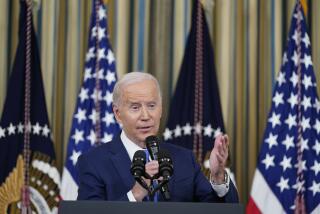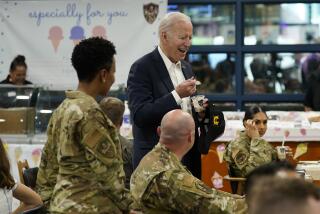Bush Eases Hard Line on Trade : Diplomacy: Not in ‘aggressive mode’ for visits to Seoul and Tokyo, he says. And his aides try to distance the President from tough stand of Big Three U.S. auto executives.
- Share via
SINGAPORE — As President Bush flies northward toward South Korea and Japan, the crucial battlegrounds of his Asian trip, he has begun to back away from a course that had seemed set on confrontation over trade.
“We’re not going in there in a kind of aggressive mode,” Bush insisted at a news conference here Saturday as he looked forward to his arrival in South Korea today and a three-day visit to Japan later in the week.
Bush declared that “we’re going to talk about economic opportunity and jobs; there’s no question about that.” However, he quickly added that his talks with Japanese and South Korean leaders would also address other “broad areas.”
And he voiced new sympathy for Japanese charges that the United States is much to blame for its $40-billion trade deficit with Japan.
“I think most American businessmen would say we’ve got to do better in trying to adapt to foreign markets,” he said, adding: “Our message is going to be listening to where we’re not doing right.”
Bush steadfastly refused to estimate the number of U.S. jobs that might be created by his trade-promotion tour, noting defensively that “much of the world has gone through some sluggish, difficult economic times.”
But he added: “Some of what we’re going to be doing is setting in motion, hopefully, machinery that will result in more American jobs.”
At the same time, Administration officials launched a preemptive campaign to put distance between Bush and top executives of the Big Three U.S. auto makers who are expected to launch sharp attacks on Tokyo when they join the White House delegation in Japan.
“They have a different agenda,” one official said as the Administration invited reporters to meet with members of the delegation who are less critical of the Japanese, “and it’s not fair to lump the President in with them.”
“If Lee Iacocca says the wrong thing,” Winston Chen, president of the Silicon Valley-based Solectron Corp., said in an interview, referring to the Chrysler Corp. chief, “he will make a fool of himself.”
While congressional Democrats have expressed support for the auto makers’ calls for new barriers to Japanese imports, Bush, an avowed free-trader, has emphasized the need to open the Japanese market rather than succumb to what he denounces as protectionist sentiment.
In seeking to underscore that difference in advance, Administration officials were blunt Saturday in expressing hope that “less sexy” members of the 21-person U.S. business delegation, rather than the auto makers, would be seen as the bearers of the President’s message.
“It’s the other 18 that we’re trying to put forward,” one White House official said.
Among those officials, Maurice R. Greenberg, chairman of the American International Group, noted pointedly in an interview Saturday that, within the delegation, “everybody has different agendas.”
Using a metaphor drawn from football, Greenberg indicated that the business leaders traveling with Bush are alike in their “concern about playing against a team that has 12 downs when we have only four.”
But he and the other businessmen-delegates expressed little sympathy for auto makers’ complaints. And a White House official said the Administration sensed little public support for Detroit’s demands.
“I like my Honda,” the official said, paraphrasing what he described as an average voter’s sentiment. “Why should I buy a Chrysler?”
The soothing words from White House officials appeared intended to ease Japanese apprehensions about a hard-line Bush approach and to blunt the prospect that the presidential visit could provoke anti-Japanese sentiment.
But after advance billing of the trip as a quest for “jobs, jobs, jobs,” the softer Bush line could open the President to further criticism from Democrats who have already begun to charge that he is not delivering on his message.
And so prominent are Iacocca, General Motors’ Robert C. Stempel and Ford’s Harold A. Poling as members of the Bush delegation that White House officials concede that their message may inevitably be seen to bear an official U.S. stamp.
As Bush arrives in South Korea, trade issues are expected to assume only second place on the agenda. Administration officials said that the President would devote the bulk of his attention to defense issues and would reaffirm an American commitment to South Korean security.
But Bush was also expected to “twist the arm” of South Korean officials in hopes of persuading them to moderate a buy-domestic campaign that has dampened the market for U.S. imports.
South Korea has already taken some import liberalization measures and, partly as a result of those steps, its trade surplus with the United States, which was $9.6 billion in 1987, dropped to $2.4 billion in 1990, and turned into a $700-million trade deficit last year.
More to Read
Get the L.A. Times Politics newsletter
Deeply reported insights into legislation, politics and policy from Sacramento, Washington and beyond. In your inbox three times per week.
You may occasionally receive promotional content from the Los Angeles Times.










